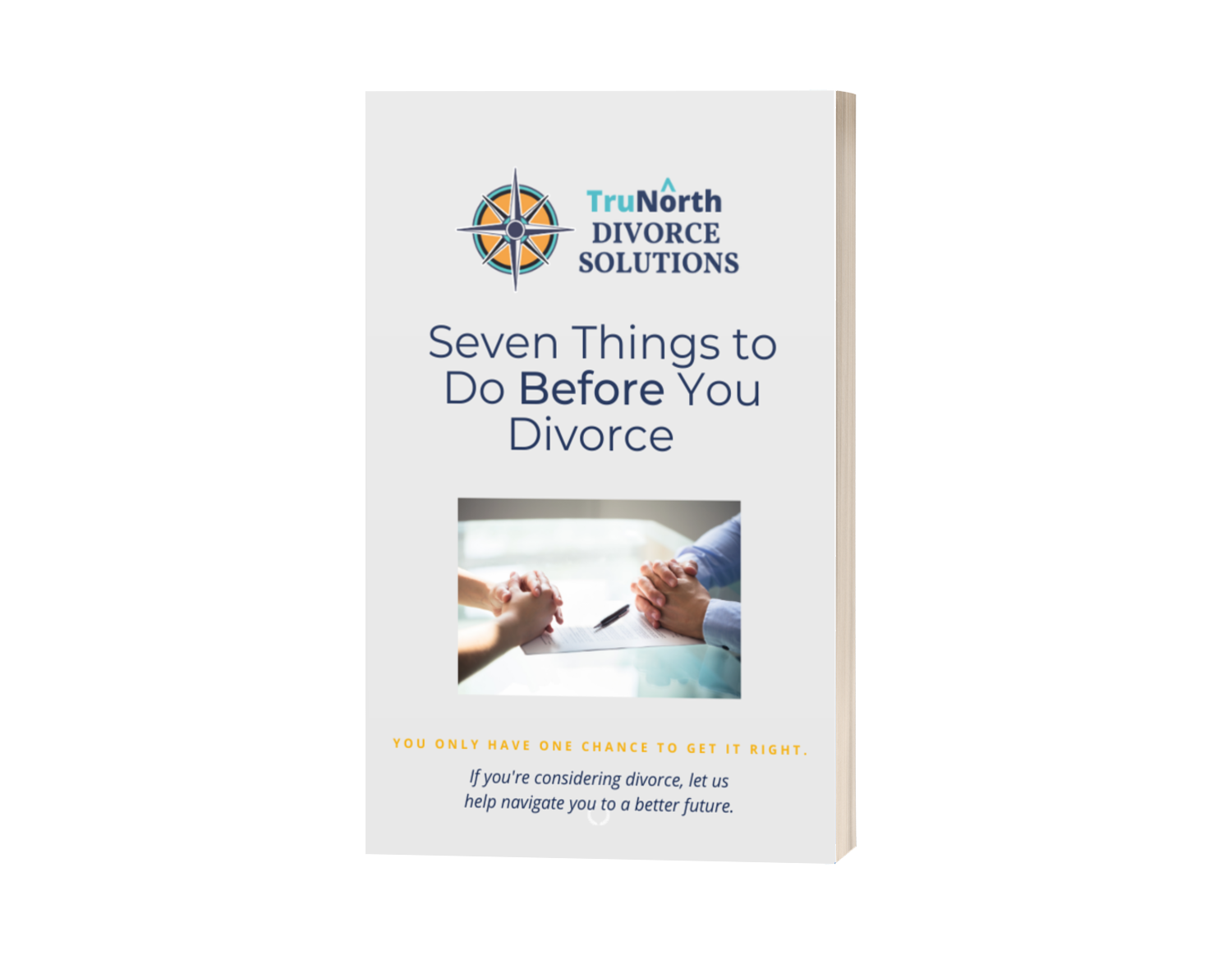SEVEN THINGS TO DO BEFORE YOU DIVORCE
Get Our FREE eBook!


When it comes to divorce, one size definitely doesn’t fit all. Like choosing between taking the scenic route or the highway, your choice of divorce process can significantly impact your journey. Let’s explore three distinct paths—collaborative divorce, traditional litigation, and mediation—to help you find the approach that best fits your situation.
Picture a courtroom with its formal procedures, judge’s gavel, and strict rules of engagement. This is the traditional litigation route, where a judge serves as the ultimate decision-maker when you and your spouse can’t agree. While it might sound intimidating (and it can be), sometimes it’s exactly what you need.
Think of litigation as the heavyweight champion of divorce options—powerful but costly. Your wallet will certainly feel the impact of court fees, lawyer fees, and expert witness fees, all adding up faster than you can say “objection!” Time-wise, expect the pace of a tortoise carrying a heavy load. And emotionally? Well, it’s like going through a marathon where nobody really wins.
Now imagine a different scene: instead of a courtroom, you’re in a conference room with a team of professionals all focused on helping you reach a settlement. That’s collaborative divorce—more like an intense problem-solving workshop than a battle.
While collaborative divorce isn’t exactly budget-friendly (think store-brand versus name-brand cereal—still substantial but not quite as expensive as litigation), it offers significant value for your investment. You get a support team to help navigate both the emotional roller coaster and the practical challenges, plus the process typically moves faster than litigation while allowing more time for thoughtful decision-making than mediation.
Mediation sits at the other end of the spectrum—quick, relatively informal, and usually less expensive than the other options. Think of it as the express lane of divorce processes.
Remember though—choosing litigation doesn’t automatically mean you’re headed for an all-out court battle. Many litigated divorces still settle out of court, but having the structure and authority of the court system can provide necessary leverage and protection.
The collaborative process really shines when you need comprehensive support but want to avoid the battleground of litigation. It’s particularly effective for complex situations that need multiple perspectives to reach fair solutions.
To help you evaluate which path might work best for you, here’s how the three approaches compare on key criteria:
| Criteria | Collaborative Divorce | Litigation | Mediation |
| Cost | Moderate to High -Multiple professionals involved -More cost-predictable than litigation | Highest -Court costs -Attorney fees -Expert witness fees | Lowest -Single mediator fee -Optional attorney consultation |
| Timeline | 3-8 months typical | 6 months to 2+ years | 2-6 months typical |
| Legal Protection | Strong -Each spouse has an attorney -Full professional team | Strongest -Court oversight -Formal discovery -Emergency orders available | Limited -No built-in legal protection -Can consult attorneys separately |
| Control Over Outcome | High -Couples make decisions -Professional guidance | Low -Judge makes final decisions -Court-imposed solutions | High -Couples make decisions -Mediator facilitates |
| Professional Support | Comprehensive -Two attorneys -Financial neutral -Mental health professionals -Child specialists -Other experts as needed | Varies -Individual attorneys -Court-appointed experts -Individual experts as needed | Limited -One mediator -Can consult experts separately |
| Best For | -Complex finances (unless you mediate with a CDFA®) -Need for professional guidance -Power imbalances -High-asset cases -Child-focused solutions | -Hidden assets -Domestic violence -Uncooperative spouse -Emergency needs -Legal precedent needed | -Simple finances (unless you mediate with a CDFA®) -Good communication -Limited budget -Quick resolution -Straightforward split |
| Privacy | Private -Out of court -Confidential process | Public Record -Court filings public -Court appearances | Private -Out of court -Confidential process |
| Emotional Impact | Moderate -Support team available -Focus on cooperation | Highest -Adversarial process -Limited emotional support | Moderate to Low -Less adversarial -Limited emotional support |
Remember, in the game of divorce, success isn’t about winning or losing—it’s about emerging with your sanity (and some of your stuff) intact. Sometimes the fastest route isn’t the best, and sometimes the most expensive option isn’t necessary. Your choice should reflect your specific circumstances, priorities, and the long-term impact you want to achieve.
Consider your specific situation:
The answers to these questions will help guide you toward the process that’s right for you. After all, divorce isn’t just about ending a marriage—it’s about creating a foundation for your next chapter.
Looking to explore your divorce options including mediation? Berni Stevens, an experienced mediator, divorce coach, and Certified Divorce Financial Analyst® (CDFA), supports clients in mediation, collaborative divorce, and litigation.
Schedule Your Complimentary Divorce Strategy Session Today!
You can read more divorce related articles, news and resources here. Don’t forget to follow along on social media for helpful divorce tips and resources!

Once upon a time, in the land of Breakupsburg, there lived three divorce options: Papa Bear Litigation (too hot), Mama Bear Mediation (too cold), and Baby Bear Collaborative Divorce. Let’s explore why collaborative divorce might be the bowl of porridge that’s just right for many couples.
Collaborative divorce strikes a balance between the formality of litigation and the informality of mediation. You get legal representation without declaring all-out war. It’s like having a peace treaty and a battle plan at the same time.
Unlike litigation (where you might feel like a spectator in your own divorce) or mediation (where you might feel under-supported), collaborative divorce gives you a team of professionals without overwhelming you. It’s like having a personal cheering squad, but they all have advanced degrees.
More structured than mediation, but more flexible than litigation, collaborative divorce offers a “just right” process for many couples. It’s like having a map for your journey, but you can still take scenic detours if needed.
You get the financial and child expertise you need, without the overkill of multiple court-appointed experts. It’s like having a Swiss Army knife instead of an entire toolshed – just the right tools for the job.
Move faster than litigation allows, but take more time than mediation might to really work through issues. It’s like a divorce slow cooker – it takes time, but the results are worth it.
More supported than the direct negotiations in mediation, but less adversarial than communication through litigation. It’s like having a translator for those times when you and your ex seem to be speaking different languages.
Unlike litigation (which looks mainly at the past and present) or mediation (which might not have the tools to plan extensively), collaborative divorce helps you create a vision for your post-divorce life that’s just right. It’s like having a GPS for your future, not just a rearview mirror.
Remember, like Goldilocks, you might need to try a few approaches before you find the one that’s just right. But for many couples, collaborative divorce offers that perfect middle ground – not too hard, not too soft, but just right for moving forward into your new life.
So, if you’re looking for a divorce option that’s not too hot, not too cold, but just right, collaborative divorce might be your Goldilocks solution. It might not come with a fairy tale ending, but it could help you write a pretty good “happily ever after” for your post-divorce life.
Looking to explore your divorce options including mediation? Berni Stevens, an experienced mediator, divorce coach, and Certified Divorce Financial Analyst® (CDFA), supports clients in mediation, collaborative divorce, and litigation.
Schedule Your Complimentary Divorce Strategy Session Today!
You can read more divorce related articles, news and resources here. Don’t forget to follow along on social media for helpful divorce tips and resources!

When it comes to divorce, dividing assets can feel overwhelming. It’s also often more complicated than simply deciding who gets the dog (though let’s face it, belly rubs do go a long way!). For many couples, the process of dividing assets brings up important questions. For example: What counts as marital versus separate property? And how do you fairly value pensions, estates, or other high-value assets? These are critical decisions that will ultimately shape your financial future, so they require a well-informed and thoughtful approach.
At TruNorth Divorce, we specialize in guiding you through this complex process. Our comprehensive services include divorce financial analysis, mediation, and collaborative divorce, each one focused on making sure that asset division is handled with the utmost expertise and fairness. Whether you’re managing high-net-worth estates or working through the intricate details of a tax-optimized settlement, we’re here to help make these challenging decisions easier. We want both parties to benefit from fair and balanced outcomes, so you can focus on moving forward.
If you’re beginning to explore your divorce options, including mediation, TruNorth’s Berni Stevens is ready to support you at every step. As an experienced mediator, divorce coach, and Certified Divorce Financial Analyst® (CDFA), Berni provides invaluable expertise in mediation, collaborative divorce, and litigation. Her mission is to empower clients to make confident decisions that serve their best interests throughout the divorce journey.
Taking control of your financial future can start with a single step. Set up a free Divorce Strategy Session with us today, and let’s work together to clarify your next steps.
For further insights and support, check out our full collection of divorce-related articles, news, and resources here. And don’t forget to follow us on social media for ongoing tips and resources to help you navigate this journey with greater confidence!

Are you considering divorce but dread the thought of courtroom drama? There’s another approach besides mediation that you may want to consider. Let’s dive in to explore!
Many couples consider the possibility of mediation before engaging in divisive litigation. But what if mediation doesn’t seem just right? You can still divorce your spouse without divorcing your bank account or your sanity. Think of collaborative divorce as like a divorce party where everyone’s invited – you, your soon-to-be-ex, a couple of lawyers, and a team of professionals who aren’t there to judge you (unlike your in-laws).
Think of it as putting together an all-star lineup for Team Amicable Separation. Here’s who you’ll have in your corner:
You’re the main characters in this divorce story. Your job? Try to keep it from turning into a tale of woe.
In collaborative divorce, you’re not just hiring a lawyer – you’re assembling a team of professionals to guide you through the process. Let’s take a closer look at each team member and their crucial roles:
Think of them as your legal navigators and negotiators-in-chief.
Remember, unlike in litigation, these attorneys are committed to finding mutually beneficial solutions, not “winning” at all costs.
This financial guru is like a treasure map reader for your assets and debts.
Consider them your emotional Sherpas, guiding you through the psychological terrain of divorce.
These are your special ops team, brought in for specific missions.
Imagine all these professionals as a well-oiled machine, each part working in harmony:
The beauty of this team approach is that it addresses all aspects of your divorce – legal, financial, emotional, and parental – in an integrated way. It’s like having a personal board of directors for your divorce, all working towards the common goal of a fair and sustainable agreement.
Remember, while this team might seem like a lot, they’re all there to make the process smoother, more efficient, and ultimately more beneficial for everyone involved. It’s not just about ending your marriage; it’s about setting you up for success in your post-divorce life.
Collaborative divorce works best if you and your ex can still be in the same room without reenacting famous feuds. If you’re more “mortal enemies” than “amicable exes,” traditional litigation might be your only option.
Remember, divorce doesn’t have to be a battle where the only winners are the lawyers. With collaborative divorce, you can split up and still split a pizza afterward. It’s not just a divorce; it’s a divorce with a silver lining!
So, if you’re looking for a kinder, gentler way to say goodbye to your marriage, collaborative divorce might just be your ticket to a smoother split. Who knows? You might even remain on speaking terms with your ex. On a personal note, my ex and I continue to share major holidays and celebrations with our children—over twenty-five years after the divorce! It may not seem conceivable now, but an amicable divorce can lay the groundwork for a united family in the future.
Looking to explore your divorce options including mediation? Berni Stevens, an experienced mediator, divorce coach, and Certified Divorce Financial Analyst® (CDFA), supports clients in mediation, collaborative divorce, and litigation.
Schedule Your Complimentary Divorce Strategy Session Today!
You can read more divorce related articles, news and resources here. Don’t forget to follow along on social media for helpful divorce tips and resources!

Divorce is never easy, but it doesn’t always have to be a battlefield. For many couples, mediation offers a more amicable and cost-effective alternative to traditional litigation. As a divorce mediator in Maryland, I’ve seen firsthand how mediation can save couples time, money, and emotional stress. But one question I’m often asked is, “How much does divorce mediation really cost?” In this comprehensive guide, we’ll break down the costs associated with divorce mediation, compare it to other methods, and help you understand what factors influence the overall expense.
Before we dive into specific numbers, it’s important to understand that the cost of divorce mediation can vary widely based on several factors. These include your location, the complexity of your case, the mediator’s background and experience, and the number of sessions required to reach an agreement.
In the U.S., the average cost of mediation typically ranges from $3,000 to $8,000 for a full mediation process. Some mediators charge by the hour, with rates often between $200 to $500 per hour.
Typically, the costs mentioned above cover the mediator’s time for sessions and some preparation work. However, they usually do not include:
The cost for preparing and filing divorce papers can range from $300 to $1,500 or more, depending on the complexity of the case and whether an attorney is involved. Court filing fees are separate and vary by county, typically ranging from $100 to $400.
Several key factors can significantly impact the overall cost of your divorce mediation:
The professional background of your mediator can have a substantial influence on both their hourly rate and their approach to your case. Let’s break down the typical costs and benefits associated with different types of mediators:
Attorney-mediators bring extensive legal knowledge and understanding of court expectations. It’s important to note that while attorney-mediators bring valuable legal expertise to the table, they cannot provide legal advice to either party during mediation. Their role is to facilitate agreement and provide general legal information, not to act as an attorney for either side. Moreover, most mediated cases do not require legal knowledge beyond what is readily available to the public and other professionals who specialize in divorce. They also do not have an in-depth understanding of divorce finance nor handling of complex emotional situations.
Therapist mediators are particularly beneficial when there are significant emotional issues or child custody disputes. They can help navigate complex emotions, facilitate better communication, and keep the focus on the best interests of any children involved. They also do not have an in-depth understanding of divorce finance nor handling of complex emotional situations.
Financial mediators are invaluable when dealing with high-net-worth divorces, complex asset divisions, or cases involving business, pension or executive compensation valuations. They can provide insights into the long-term financial implications of various settlement options. They typically do not have the skills required to handle complex emotional situations or custody disputes.
When choosing a mediator, consider not just the hourly rate, but also how their specific expertise aligns with your needs. Sometimes, paying more for a mediator with the right background can lead to a more efficient process and better outcomes, potentially saving money in the long run.
The more complex your situation, the more time (and thus, money) it will likely take to reach a resolution. Factors that can increase complexity include:
If you and your spouse are generally cooperative and willing to compromise, your mediation may proceed more quickly and cost less. High-conflict cases often require more sessions and more intensive mediator involvement, increasing the overall cost.
As with many services, the cost of mediation can vary significantly based on where you live. Urban areas and regions with a higher cost of living typically have higher mediation rates.
Most divorces require multiple mediation sessions. The number can range from 2-3 for very simple cases to 10 or more for complex situations. Each session typically lasts 2-3 hours.
While the cost of divorce mediation can vary widely, it’s generally a more affordable option than traditional litigation. More importantly, it often leads to better outcomes for all involved, especially when children are part of the equation.
When choosing a mediator, consider not just their hourly rate, but also their professional background and how it aligns with your specific needs. Sometimes, paying more for the right expertise can lead to a more efficient process and better long-term outcomes.
Remember, the goal of mediation is not just to end your marriage, but to do so in a way that allows both parties to move forward positively. When viewed through this lens, the cost of mediation can be seen as an investment in a healthier, more stable future for you and your family.
Ultimately, the decision to pursue mediation should be based on your unique circumstances, financial situation, and willingness to work cooperatively with your spouse. For many couples, the combination of cost savings, reduced stress, and better outcomes makes mediation an invaluable tool in navigating the challenging process of divorce.
As you consider your options, don’t hesitate to reach out to multiple mediators for consultations. Most offer an initial meeting at low or no cost, allowing you to find the right fit for your situation. With the right mediator and a commitment to the process, you can navigate your divorce with dignity, fairness, and financial wisdom.
Looking to explore your divorce options including mediation? Berni Stevens, an experienced mediator, divorce coach, and Certified Divorce Financial Analyst® (CDFA), supports clients in mediation, collaborative divorce, and litigation.
Schedule Your Complimentary Divorce Strategy Session Today!
You can read more divorce related articles, news and resources here. Don’t forget to follow along on social media for helpful divorce tips and resources!